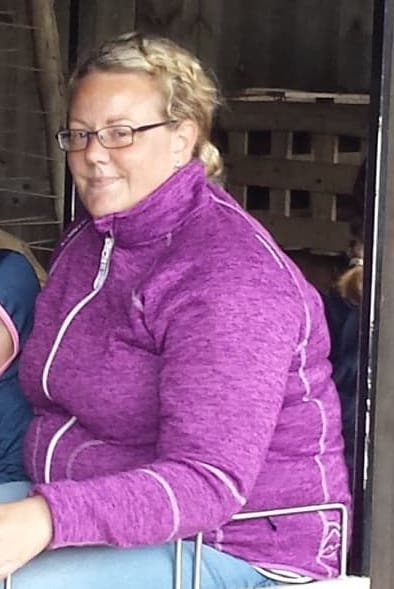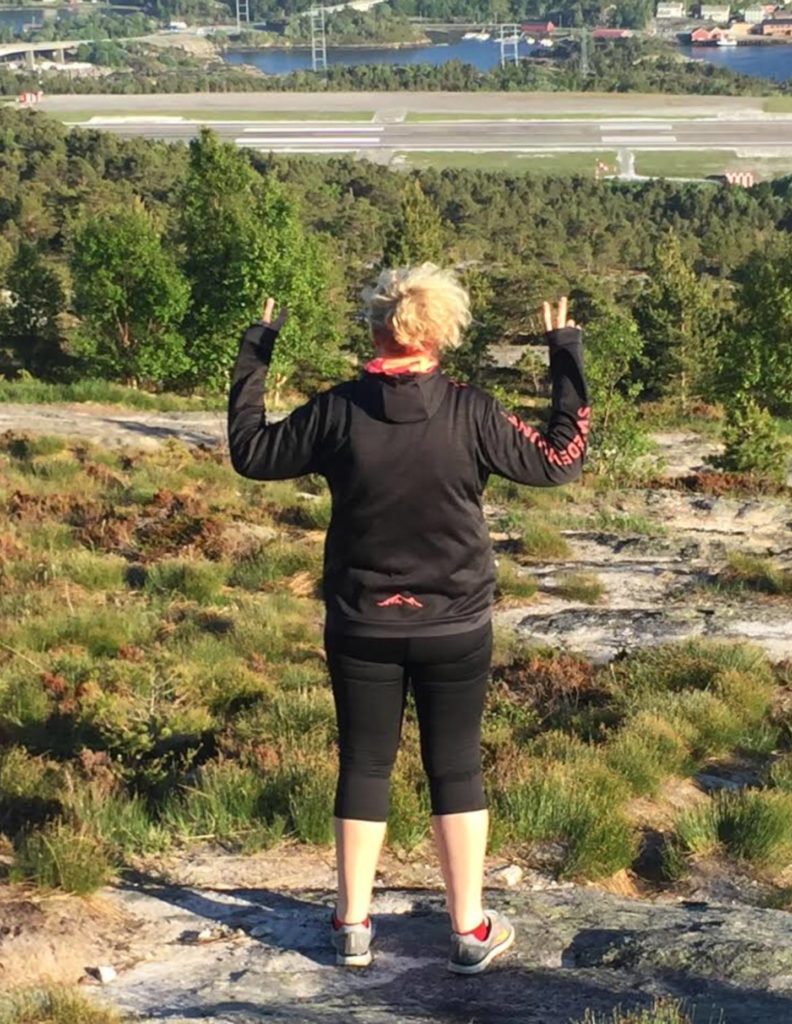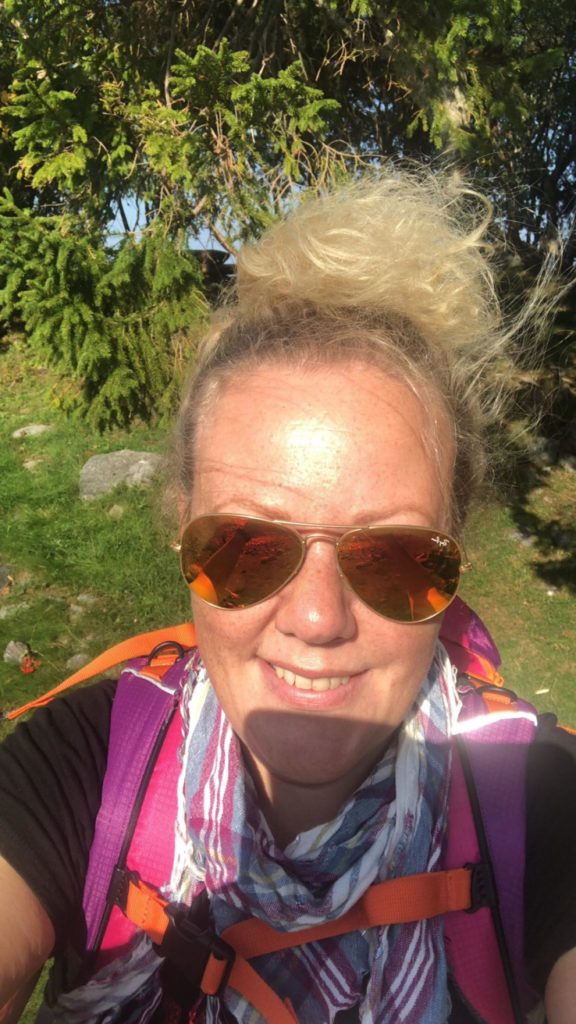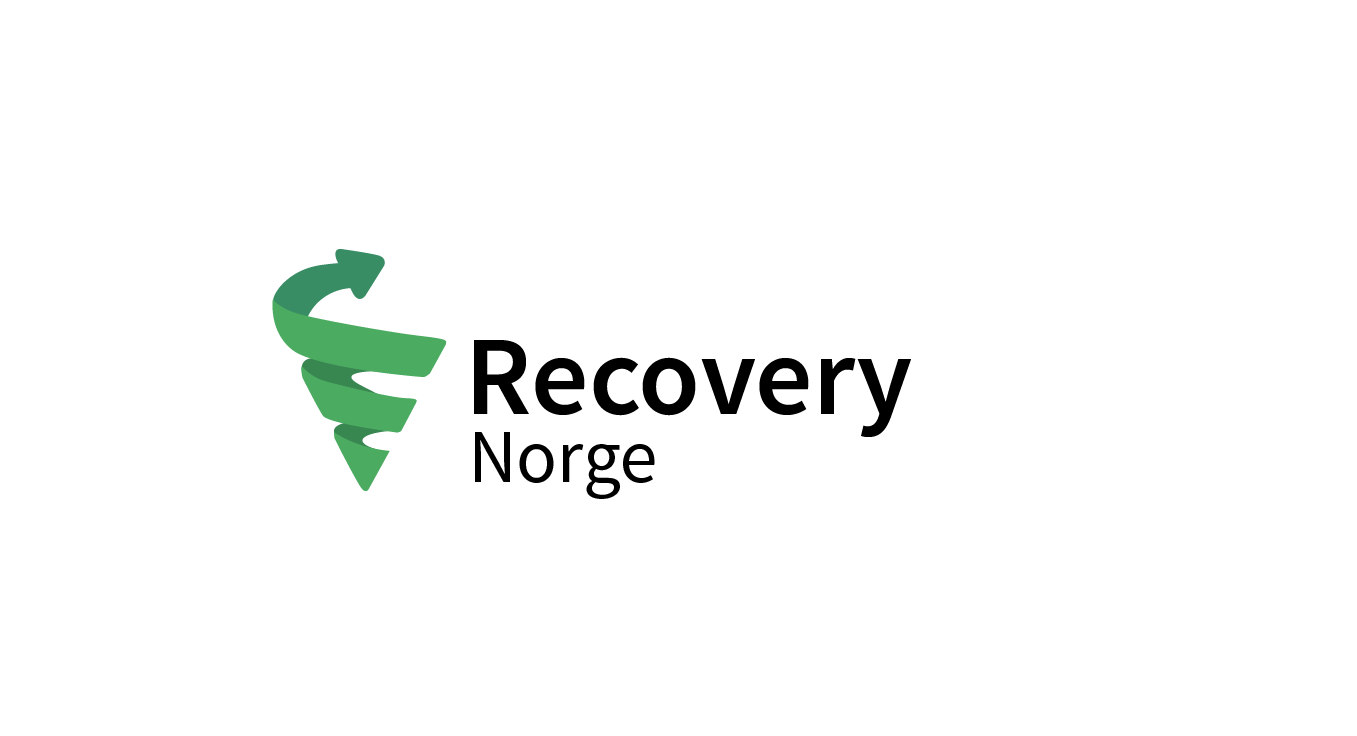Author: Kristin
I start physiotherapy and notice a little improvement. The physiotherapist detects inflammation in my upper and neck, tendonitis in the right arm and tight muscles in the head and face as well. This causes my tormenting tension headaches. I myself connect my condition to the fact that at the beginning of the year I get a new boss at work, and there is a lot of mistrust and monitoring of the employees, including me. I end up working on the brunt of the team’s tasks to meet the arrears requirements of my new manager. I end up doing a lot of overtime at the expense of my family.
An unhelpful pattern
I find that every day I am getting very tired after 4-5 hours at work. I can’t gather my thoughts, can’t concentrate and I can’t remember simple things. I call this “syrup brain”, but have since learnt that this is also known as “brain fog”.

At the start of 2016, I am becoming more and more tired, and slowly but surely I develop a pattern that I gradually see is not healthy for me. I have three children who were then 7, 4 and 2 years old. Every day I arrange the family, drop them off at kindergarten and school, get to work, pick up children, cook dinner, spend the afternoon sitting on the couch or floor with the kids. Then, in the evening, when my oldest child go to bed at 7.30-8pm, I can go to sleep myself. This continues, and I have no time for myself. I experience anxiety, and I’m constantly over thinking that something will happen to my children, my husband and my parents. I have also noticed that my right eye has been blood shot for quite some time, and I’m eventually referred to the ophthalmologist to have this checked.
What is wrong??
I have regular consultations with my general practitioner, and on the 29th og March, I collapse in tears. I am encouraged to take sick leave for one month because of the pain I’m experiencing in my neck, head, inflamed eyes and exhaustion. I don’t get any better during that month, but, when I go back to work, I reduce my hours to 60%. Soon after returning to work, I have an appointment with the ophthalmologist who detects iris inflammation and a tear in the retina – this must be treated immediately by laser or there is danger of losing sight of the right eye. I am told that one does not get iris inflammation in isolation; it comes as a reaction of something else, a rheumatic disease. I catastrophize this diagnosis and keep thinking “what’s wrong with me ??”
I catastrophize this diagnosis and keep thinking “what’s wrong with me ??”
I decide to take action and find out what is making me so tired and exhausted. I spend a lot of time on the internet looking into possible causes, and I get totally obsessed with getting lots of blood samples. I suspect low metabolism or rheumatic disease. All blood tests are negative. I start to get anxious that I have a tumor in my head because I have such extreme headaches. A CT scan is taken of both my head and pelvis in to look for Bechterews disease. I lie anxious inside the CT scanner, feeling like I’m going to suffocate.
The CT shows that everything is normal.
Cognitive therapy
I realize in May that I am unable to work 60%, and I collapse at my doctor’s office again. I tell them all about the anxiety I’m experiencing, I cry a lot, and then he says, “It sounds like you’re burned out”. He then recommends cognitive therapy. I am a little hesitant, because I have worked in psychiatry in my hometown for many years, and the idea of receiving therapy as a patient, from someone I don’t know, makes me feel a little uneasy. I consider this option for a while and decide to contact the municipal offer of cognitive therapy. My referral is processed quickly, and I am told that in 6-8 weeks, I will get an assessment interview.
I feel like I am a hostage in my own body. I have pain in my knees and some days I can’t manage to get up the stairs to the living room. My body feels like a huge lump.
Extreme exhaustion
From the beginning 2016, I begin to experience strong exhaustion. I remain at home, struggling to ever leave the house. I alternate between lying on the couch and in my bed. I can’t even handle taking a shower until it is absolutely necessary (every three days), because even the thought of standing up, washing myself and then getting dressed is exhausting. All I seem to handle is emptying the dishwasher, and even that is a battle uphill. I am lying on the couch, and as I am comfort eating a lot, I gain 15-16 kilos in a year. I can’t cook properly for my kids, only sausages and tomato soups. I can’t stand contact with friends, and I say no to any event or plan they or my family suggest. I am obsessed in finding out what can get rid of my exhaustion and tension headaches. It is the same treatment: walk, exercise, relaxation or meditation (attentive presence). I try to get out and go for a walk when the children are in school and kindergarten, but I don’t get very far. I buy myself a bike and try to go on bike rides, but there are few trips.
I feel like I am a hostage in my own body. I have pain in my knees and some days I can’t manage to get up the stairs to the living room. My body feels like a huge lump.
I feel like I am a hostage in my own body.
It is so distressing for me to be in this situation, and my mind is spinning; will it be like this forever? I also struggle all the time with my memory, I don’t remember where I put things, and I miss appointments etc.
A midsummer´s nightmare
The summer holidays are a nightmare, I do not rest much, and it doesn’t help that I put the children first and go to the Hunderfossen Family Park and The Zoo in Kristiansand. I am constantly dizzy, and it honestly feels like I’m going to die soon.
On two occasions I experience panic attacks, thinking that my son is going to drown (he is down by a river in a vest and a rubber boat). I realize that the more tired I am, the more I catastrophize everything. I get a new iris inflammation, but now I start to think that it may be the stress and exhaustion that makes it flare up. I go to the hospital for treatment of my iris, and it is a big strain on me.
I am so exhausted after the summer holidays that it is a real pleasure to come back to everyday life with the oldest child at school and the two youngest in kindergarten. I sleep a lot, at least 14 hours a day during this period.
I sleep a lot, at least 14 hours a day during this period.
Changing thought patterns
I get home to the municipality in August, and I start cognitive therapy. I have 8 treatment hours, and halfway through I notice that something is happening. In October, I see a rheumatologist, and I do not have rheumatic disease, which is a relief. The rheumatologist refers me to a neurologist because of the headache.
I am able to leave the house and go on walks, the fall is nice and the whole family and I have a barbecue almost every weekend.
I have worked very diligently to change my thought pattern, exchanging automatic negative thoughts with supportive thoughts.
I work very diligently to change my thought patterns, exchanging automatic negative thoughts with supportive thoughts. I set aside time to worry instead of worrying all the time, and I have been releasing many concerns. I often meditate and notice how tense the body was when muscle after muscle relaxes during. I have tried to work with mindfulness, and look at the simple pleasures of life. I enjoy it. Everyone speaks positively about cognitive therapy – and I totally agree.
In January, I am with a neurologist and get diagnosed with tension headaches and drug-induced headaches cause by my daily use of paracetamol (acetaminophen) and ibuprofen. During this period, I am not bothered so much by exhaustion, as I feel that I have found a good balance between rest and activity, as well as cognitive treatment.
Starting to work
At the end of January 2017, I start working 10 hours a week. It is challenging, but at the same time it feels very good to be back and to catch up with my colleagues. I now have a new manager, and I feel like I’ve started on a new page. In March, I increase my hours to 40% – 15 hours a week. Again, it’s tough. The weeks are as follows: Mondays: recovery day after the weekend where I rest a lot and go hiking, Tuesday, Wednesday and Thursday: working 5 hours (I meditate at work every day), home to sleep before the kids come home, Friday: recovery day to rest after 3 days at work and “recharge” for the weekend. My mother thinks it’s really awful to have it like that, and that maybe I shouldn’t go to work right now.
Easter 2017, we go on holiday where my parents have a house and where we are in the process of restoring a cottage. The weather is nice, and I feel in great shape. My watch shows that I do 10000-12000 steps every day, and this isn’t from my walks, I’m just out with the family in the garden, enjoying myself. I am happy and think that, maybe, I am now rid of the exhaustion.
But when Easter comes around, my body feels very weak again. I get so tired, I can only lie on the sofa or my bed. I am freezing, and think a cold is on the way. This goes on for a few days. But it wasn’t a cold; it was the exhaustion that had come back. After Easter I was still very tired, lying on the couch a lot not being able to do anything at home.
What more can I do? Contrinue to wait and hope that it one day will pass?
I’m so tired of this, and I’ve learnt all the cognitive therapy had to teach me. What more can I do? Continue to wait and hope that one day it passes?
Lightning Process
June 8th, 2017, I sit and look through a Snapchat story from Casa Kaos (Marte Frimand-Anda). There is a picture of a well-known LP-instructor with the text “she thought her way out of ME”. I take a screenshot, and then I search the internet. I immediately reserve a copy of the book “Wake me up when it’s over” at the library, and pick it up the following day. I read the book in two days, and recognized myself in many of her descriptions, only in a very light version. On her Facebook page, I read lots of very positive reviews from people who had read her book and who have attended her courses. I discussed this option with my husband, and I decided to apply for a Lightning process (LP) course. I thought this might be my rescue, and it did turn out to be.
My husband and I traveled to Oslo and attended the LP course in September 2017. I was so excited but I didn’t understand how this was going to work. How could this remove the chronic fatigue?
Suddenly better!
I started using the LP technique immediately on the bus back to the hotel after the first day of the course, when I was so tired and simply overwhelmed. I continued when we got to the hotel, and then we went to Tjuvholmen in Oslo to have dinner at Døgnvill, a restaurant making burgers. I even used the LP technique on the toilet, and I had a great date with my husband!
We decided to visit the Vigeland Park the following day, before the course started. I wasn’t sure I’d be able to manage it all, but it went really well! We had the best time in the park, and then went straight to the course. After that, we then walked to the hotel before exploring the Karl Johan castle and so on, until we ended up in a restaurant for another dinner date. I didn’t have to sleep between any of this!
Day 3 was also a great experience, mostly because I realized that I was finally going to get my life back. I got a little tearful.
I realized that I was finally going to get my life back.
Now 12 months have passed since I attended the courses, and I have achieved the following positive changes:
- Stopped sleeping in the day and I’m not exhausted anymore
- I do positive things and think positive thoughts
- Started at the fitness center – exercising strength twice a week
- Changed back to a healthy diet and dropped 20 kilos
- Take walks in nature as often as I can
- Tackle stress in a completely different way than before
- Significantly improved self-image
- I am less overwhelmed
- Increased working hours to 60% position which I’m managing fine, much better concentration.
- Much better mood and energy
- Emotionally stable (don’t cry)
- I’m baking again
- Relaxing well in the evenings, and I’m able to go for a walk
- Zero grit tanks
- Have lowered the standards and expectations I put on myself and in doing so have gained much more self respect. The choices I make are good and I trust that I can make the right decisions on various issues.
- Always watching out for new stress triggers and I make sure to do the technique when I’m on the road.
- I’ve included more structure and planning in my life, which has made it much easier to make my days more manageable.
Meeting LP friends
In the past six months I have met four others from my hometown who have also taken the Lightning Process course (3 of them have had an ME diagnosis). We meet once a week. I prioritise this, as meeting with these new friends is incredibly rewarding. We have good conversations and laugh a lot. We help each other and share experiences – it’s incredibly useful!
I am looking forward for this feeling to continue
I’m so glad I took the choice to take the LP course. Now, when I read my story about the time I was sick, I can hardly believe it was ever that bad. But it was, which is why it is so amazing that I no longer feel like that. I am looking forward for this feeling to continue, looking forward to increasing work slowly but surely, to be able to follow my children through kindergarten, school, homework, leisure activities, friends visiting, renovation of the cottage and many other things.

It takes training
I’m still working 50%, and I’m still working on myself every single day. The body has recovered faster than the brain, my concentration and memory still need some work, but I’m confident they will improve with time. It just requires self-effort.
I think another reason that all of this happened to me was because I got the mononucleosis in 1995 and was sick for months. As well as a mycoplasma pneumonia when I was heavily pregnant in 2013, which also lasted several months. I imagine the body as a cup, and as it fills up with illnesses and stresses, it eventually spills over. In my case, there was mistrust at work. That was when I fell into the ditch.
Had I not tried cognitive therapy and seen how effective it was, I probably would have never bothered with LP.
And if I had not received all help that I did, I would probably would of ended up with a CFS/ME diagnosis. Luckily, I didn’t get that far.

Life is smiling
Kristin
Kristin was almost 40 years old when this was published.

Leave a Reply